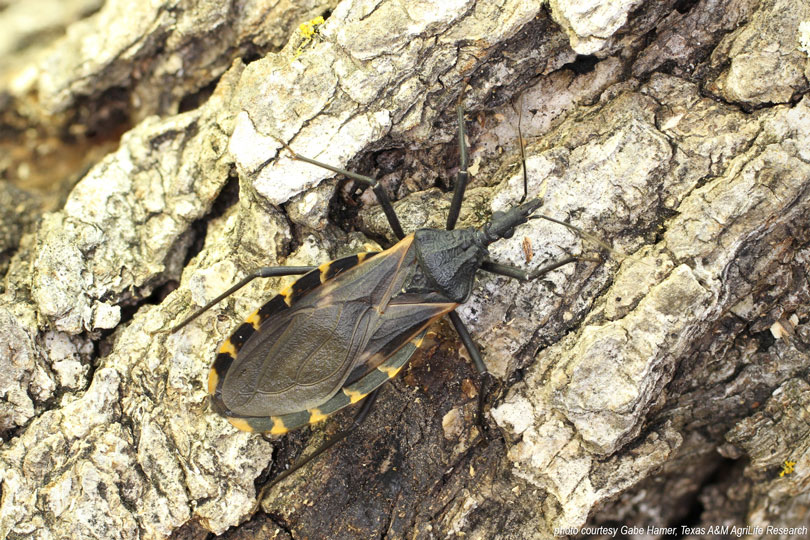By Jennifer Dorsett
Field Editor
The brown and yellow-striped insects called kissing bugs may have a funny name, but the parasite carried by the insects is no laughing matter.
Kissing bugs carry a microscopic parasite, Trypanosoma cruzi, which causes the potentially fatal Chagas disease in mammals.
“We have already collected over 300 adult kissing bug specimens in a location where we only collected six individuals in 2019,” AgriLife Research Entomologist Gabriel Hamer said, referring to a collection site in the Rio Grande Valley city of Mission. “The lab’s kissing bug collections from College Station are also higher than in normal years.”
In May, Hamer collected 115 kissing bugs in just three hours at the site in Mission.
The 11 species of triatomes, or kissing bugs, found in the U.S. have subtle differences in dark brown, black and orange or yellowish color patterns. There are three species found in the southern U.S., all tear-shaped and anywhere from 0.5-1.25 inches long.
Their head and mouth parts resemble cones, Hamer said. That gives them their other common name—cone-nosed bugs.
“There are many other insects that do not feed on blood that resemble kissing bugs, so it’s important to be able to distinguish the species,” he said.
According to the Texas A&M kissing bug research team’s website, these insects feed on blood at night, usually while animals or people are sleeping. Bites are generally painless, leaving most people unaware they have been bitten.
The nocturnal bugs are attracted to lights and live in a range of outdoor environments. Kissing bug infestations are most common in poorly-constructed homes without tight building construction and areas lacking good sanitation.
The insects feed on humans, dogs, wild mammals, birds and even other insects, such as crickets.
Kissing bugs themselves are not necessarily harmful. The main risk of disease comes from the parasite found in the kissing bug’s intestines and feces. Research shows 50-60 percent of kissing bugs in Texas may be infected with T. cruzi, Hamer said.
While most infected people remain symptom-free and unaware of the infection, around 25 percent of people infected with Chagas disease develop serious chronic disease, according to the U.S. Centers for Disease Control.
Chagas disease presents initially in an acute phase with symptoms including fever, fatigue, body aches, headache, rash, loss of appetite, diarrhea and vomiting. Some individuals with Chagas, however, do not exhibit symptoms.
About 30 percent of infected people later develop a chronic phase, which includes a range of cardiac and intestinal complications that may only appear years or decades after infection.
And some animals are susceptible, too.
According to a 2018 publication by Texas A&M University, dogs younger than twp years old are more likely to develop acute disease. Those symptoms include diarrhea, lethargy, seizures, swollen lymph nodes, fluid retention and heart failure.
Chronic Chagas disease in dogs can cause congestive heart failure and associated fluid buildup in the abdomen or lungs.
There is no vaccine or veterinary treatment for Chagas disease in canines or other animals.
Human treatment is limited to antiparasitic treatment to kill the parasite, according to the CDC, and symptomatic treatment to manage signs and symptoms of infection.
To control kissing bugs and the spread of Chagas disease, Texas A&M AgriLife Extension Service Entomologist Mike Merchant recommends keeping outdoor lights off at night, keeping yards and dog kennels clean and destroying trash piles and bird or animal nests and burrows near the home.
Few household insecticides are labeled specifically for use against kissing bugs, but Merchant said pyrethroid insecticides intended for use against cockroaches and other indoor pests may be effective.
He recommended using a licensed pest control professional for best results, adding professionals are better-suited to assist homeowners in controlling rodent or bird problems which may contribute to kissing bug infestations.
If you suspect you’ve been bitten by a kissing bug, consult a doctor for further testing. Animal owners who suspect animal contact with kissing bugs should consult a veterinarian.
Any insects found inside the home suspected of having bitten a human should be sent to the Texas Department of State Health Services for testing.


……” keeping outdoor lights off at night..””..
????????